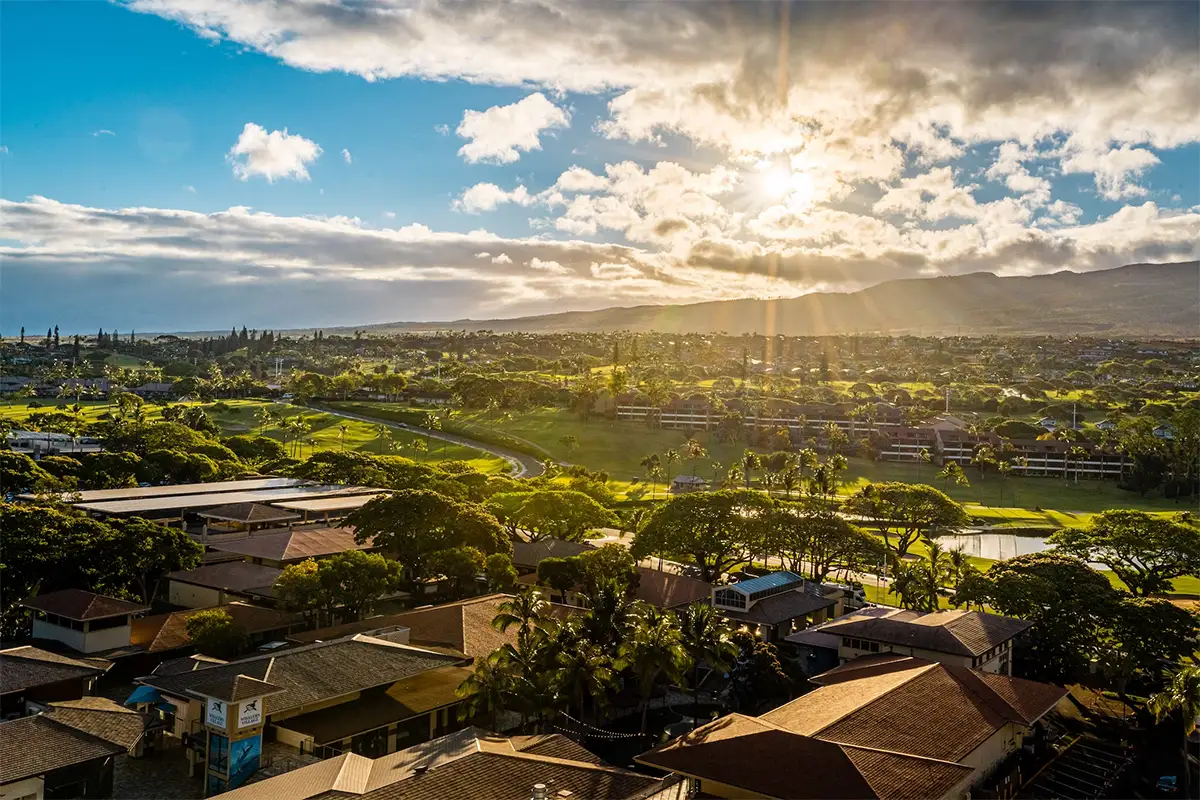 Hawai'i Journalism Initiative
Hawai'i Journalism InitiativeShort-term rentals, housing after fire among top issues in Maui County Council races

On social media, there’s an ad that features a political candidate standing along the shoreline, smiling in a purple mu‘umu‘u.
“This is Carol Lee,” the ad says, flashing a shaka emoji. “She wants to ban STRs (short-term rentals) in residential areas.”
HJI Weekly Newsletter
Get more stories like these delivered straight to your inbox. Sign up for the Hawai‘i Journalism Initiative's weekly newsletter:
Carol Lee Kamekona, who is running again for the Maui County Council, is an endorsed member of the Maui ‘Ohana Candidates slate that rose to prominence in the 2016 election on a platform of protecting people and the land against big money interests.
In the past few elections, the ‘Ohana Coalition and the groups that rose to challenge it have become the closest thing to parties in the nonpartisan County Council races. And these factions have come to define the 9-member council’s balance of power on high-profile issues from affordable housing prices to director approvals to lawsuits against the county.
This year, as shown by ads like Kamekona’s, Mayor Richard Bissen’s proposal to phase out short-term rentals is one of the biggest items on the future council’s agenda. Support comes from those who hope it will provide much-needed housing after the Lahaina fire. Opposition is led by short-term rental owners and others worried about the losses in jobs and revenue for a tourism-dependent economy.
The issue will likely influence how many residents cast their vote in the Nov. 5 general election.
NO CLEAR LINES
In 2018, Tasha Kama was the surprise story of the election when she upset former Mayor Alan Arakawa in a bid for the open Kahului seat on the council.
She was endorsed by the Maui ‘Ohana Coalition, but she soon proved to be the swing vote in a narrowly divided council that voted 5-4 along the same lines during the confirmation of the mayor’s nominees and on multiple bills.
Kama has never liked to describe herself as the swing vote, pushing instead for a united council that votes based on the issue and not on their political leanings. Kamekona, who took her place as the ‘Ohana-endorsed candidate for Kahului, unsuccessfully ran against Kama in 2020 and 2022.

This time, they’re on different sides of the short-term rental issue. Kama’s worried about the potential losses of millions in tax revenue and thousands of jobs, and has proposed a study to identify which units would be suitable for residents to live in and which should remain as short-term rentals. Because they don’t have that information, she says she doesn’t have a firm stance on the proposal and calls it “premature.”
“Since we are required as a county to balance our budget, we will need to replace the loss of STR-generated revenue or cut back services to our residents,” Kama said in emailed responses to HJI’s candidate questionnaire. “It is hard to know where to adjust the budget without knowing the magnitude of the adjustment.”
Kamekona, meanwhile, said “I fully support Mayor Bissen’s proposal” but suggested allowing full-time residents to operate up to two short-term rentals.

“Concerns over lost tax revenue from the STR phase-out are merely distractions from the conservative caucus currently on the Council,” Kamekona said via email. “Maui County Council has the authority to adjust property tax rates, particularly on vacant and second homes, to offset any revenue loss from STR phase-out.”
Painting the council in progressive or conservative terms on Maui has always come with a different connotation than the Democrat-versus-Republican spats at the national level.
Some candidates considered on the “establishment” side have worked for Democratic officials, such as Council Vice Chair Yuki Lei Sugimura (Upcountry), who served as the Maui field representative for Hawai‘i’s Democratic U.S. senators, Daniel Akaka and Mazie Hirono.
In a state where Democrats hold the majority in just about every level of government and electoral votes consistently go to Democratic presidential candidates, political races have often boiled down to moderate vs. progressive Democrats or pro-development, labor union-backed vs. environmentally focused candidates.
And while candidates have tried to avoid being pigeonholed, these perceptions tend to drive support in districts across Maui County during elections.
In 2022, the super PAC Be Change Now poured millions into backing candidates at the state and county levels, primarily in trying to push Democratic lieutenant governor candidate Ikaika Anderson against fellow Democrat and eventual winner Sylvia Luke. Funded in large part by the construction industry, the super PAC also spent thousands in advertising for Maui County Council candidates like Nohe-U‘u Hodgins and John Pele who were facing ‘Ohana candidates. (Super PACs can’t donate or coordinate directly with candidates.)
While the names of the groups vying for power in Maui County Council elections have changed, the lines have remained roughly the same.
During the 2020 election, a group called Hui O Maui Citizens for Change endorsed its own slate running against ‘Ohana candidates. They included now-Council Members Kama, Sugimura, Tom Cook (South Maui) and Alice Lee (Wailuku-Waihe‘e-Waikapū).
In the 2022 election, eight progressive candidates united under the banner of ‘Onipa‘a 2022. They included ‘Ohana candidates and now-council members Gabe Johnson (Lāna‘i), Tamara Paltin (West Maui), Keani Rawlins-Fernandez (Moloka‘i) and Shane Sinenci (East Maui).
But when it comes to the short-term rental issue, there’s no clear line drawn between political factions — some are all in, while others think it needs more ironing out.
Lee, the council chair, said she’s “not opposed to a legal and reasonable transient vacation rental phase-out, particularly in the resort areas,” but said there are broader economic implications, like decreased visitor spending and the costs it would take to convert some vacation rentals to long-term housing.
“The Council cannot act on the Mayor’s proposal without knowing the likely impacts, both positive and negative, and I will consider the overall benefit to our entire community when it comes time to act on what will likely be a more targeted phase-out in areas best suited for long-term occupancy,” Lee said.
Her opponent, James Forrest, is an environmental attorney and ‘Ohana candidate. Forrest said the proposal needs improvement to ensure housing for locals while protecting the economy. He said he would focus on incentivizing local ownership of short-term rentals.
“If a STR phase-out is passed, we can replace vacation rental tax revenues by increasing property taxes on large hotels and timeshares, and ensuring that revenue goes to affordable housing and to fund other local needs,” Forrest said.


South Maui, the district with one of the closest council races, is populated with short-term rentals and tourism-reliant businesses, particularly after the 2023 Lahaina wildfire took away most of West Maui’s tourism market.
In the August primary election, the incumbent Cook and challenger Kelly Takaya King were separated by a razor-thin margin — Cook had 11,763 votes to King’s 11,619. Both candidates favor a partial phaseout of short-term rentals.
“I would be in favor of converting some, but not all, of the current permitted operations to residential; however, I do not want the conversion of South and West Maui units to encourage new hotels to be built,” said King, who served three terms on the council. “The Council needs to develop an action plan which aligns the desired proper number of tourists with the available visitor units on the island, and also respects the desires of residents (ie. not all locals can afford high-end condos, nor do they all want to live in South Maui).”
Cook, who lost to King in 2020 and then won the open seat after she stepped down in 2022, said the county needs to identify which short-term rentals are best for long-term rentals and negotiate with owners to change the use. He said vacation rentals are needed for the economy where appropriate.
“I support phasing out short-term single-family residential units in neighborhoods,” Cook said. “I do not support phasing our short term rental units in total. Upzone to hotel use and maintain the vacation rental tax revenues.”

Most incumbents who responded to the Hawaiʻi Journalism Initiative stopped short of unconditional support for the ban.
Sugimura, who is facing Jocelyn Cruz, wondered how to replace the loss of property taxes and said she was waiting for the results of the county’s study on the bill’s impacts.
Paltin, who’s up against Lorien “Lolo” Acquintas, said if the proposal is approved, it has to be done “in the most legally defensible way” over a longer time period that could soften the financial impact, with some units in resort areas potentially left as short-term rentals.
Sinenci, who has no opponent, said he’s looking forward to discussing the issue and comparing the revenue shortfalls versus the profits that the county gets from off-island investors.
Johnson, who also has no opponent, did take a side, saying he supports the proposal and envisions the county taking charge of units so it could keep homeowner association fees reasonable.
In addition to South Maui and Kahului, two other contests on the ballot feature rematches: the Moloka‘i race between incumbent Rawlins-Fernandez and Pele and the Makawao-Ha‘ikū-Pā‘ia race between incumbent U‘u-Hodgins and Nara Boone, who said she supports phasing out short-term rentals in apartment zones.
Maui County voters can vote for all nine seats regardless of where they live.

HOUSING: THE OVERARCHING NEED
At its core, the short-term rental ban is a debate over affordable housing. It was in short supply before the 2023 fires, but since then, available units have dwindled even more with prices skyrocketing.
Some candidates think pausing luxury developments and prioritizing resources is the answer to Maui County’s housing woes.
“We should absolutely require water resources be used for affordable housing first, and stop luxury and high end housing projects until we allocate the needed water and wastewater capacity for sufficient affordable housing,” King said.
Boone believes there should be “no more luxury development allowed, period.” She wants the county to purchase land and lay infrastructure before taking bids for 100% affordable housing projects, with developments that include market-rate units built last.
“The housing crisis was dire before the fires,” Boone said. “It will take multiple solutions to get us beyond this point — including immediate legislation — to stop forcing our community out of their homes and off the island.”
Forrest also said luxury developers are inflating housing costs and draining water supplies, which “should be reserved for affordable housing, not high-end estates.”
“As a council member, I will fight to ensure that our water resources and land are used for the benefit of local families, not luxury developers,” Forrest said.
But Lee, a former county housing director, cautioned that the county needs to learn from the lessons of the past and work with housing developers. When workforce housing requirements become too strict, developers stop building, she said.
“We must resist the temptation to impose additional requirements, with the well-intentioned goal of providing more housing at affordable/workforce rates, because this will only result in another cycle of reduced supply,” Lee said.
Kama, who chairs the council’s Housing and Land Use Committee, also said the county needs to lift regulatory barriers and increase density by allowing more floors in apartment buildings, with a policy of “yes in my backyard.”
“We need to reduce the time and make it easier for the private sector to deliver housing — housing that our local residents desperately need,” Kama said.
All council candidates were given the opportunity to respond to questions on key Maui County issues. Click here to view their full responses.
For an overview of the charter amendments on the ballot, see the Hawaiʻi Journalism Initiative’s previous coverage.
For more resources on the general election, visit mauicountyvotes.gov/.





